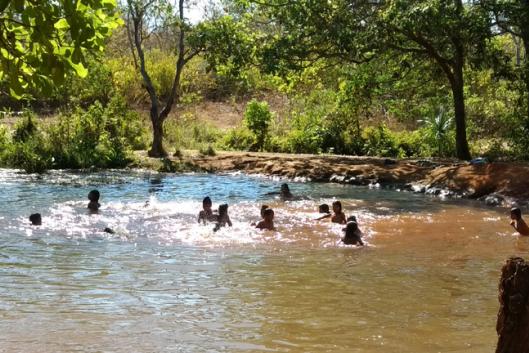This editorial aims to raise a high alert with regard to the corporate agendas that dominate international forest-related processes, which appear to be entering new phases. The decisions taken have very real impacts on forest communities; it is therefore crucial to remain vigilant against all possible risks.
This year, 2020, comes with its own challenges for forests and forest peoples, as international forest-related processes appear to be entering new phases. However, the greatest challenge that we are facing remains the same: despite growing evidence of increasing destruction and deforestation over the last 20 years, of evermore dispossession and violence towards forest peoples, international negotiations on forests have become ensnared by corporate capture and profiting, land enclosures and “greenwashing” campaigns largely based on voluntary pledges.
This editorial aims to raise a high alert with regard to the undisputed corporate agendas that dominate these international decision-making processes. The decisions taken frequently have very real impacts on the lives of forest-dependent peoples and communities; it is therefore crucial that grassroots and forest groups and their allies remain vigilant against all possible risks.
This year the 2016 UN Paris Agreement on climate will re-assess the national targets set for each country. The Paris Agreement identifies forests (and trees) as one of the main “solutions” for removing carbon dioxide from the atmosphere, thus promoting industrial tree plantations worldwide. (1) However, no agreement was reached on key issues related to carbon markets and offset mechanisms during the November 2019 UN climate negotiations. Even so, various voluntary initiatives and millions of dollars are now being invested in increasing forest-offset schemes (2) and large-scale plantations (3) as viable “solutions” to the climate crisis. Unsurprisingly, strategies for leaving fossil fuels in the ground (4) are not being discussed, despite the fact that the extraction and burning of fossil fuels has been identified as the main cause of the climate crisis gripping the planet.
During the 2019 climate negotiations, the fossil fuel and conservation industries gained momentum by developing a new term for offsetting: Nature-Based Solutions (5) (or Natural Climate Solutions), which was presented as the solution to the climatic crisis. REDD+ (6), the much-publicized forest policy that has been in place for the last 15 years, has been replaced with discourses around Nature-Based Solutions (NBS), which aim to increase carbon “storage” in the natural world. Meanwhile, discussions around deforestation have been replaced by the term “restoration”. Once again, it is not about addressing the real drivers of the climate crisis. We face a scenario full of opportunities for the corporate sector, as the responsibility for the climate crisis is not placed with the corporations responsible for large-scale deforestation, forest degradation and climate pollution, but with peasant and indigenous farming practices.
Another international process that has been set up for this year is the Global Biodiversity Framework post-2020 at the UN Convention of Biological Diversity (CBD). The CBD is supposed to aim to protect biodiversity, but conversely has also promoted harmful false solutions, such as biodiversity offsets. (7) This mechanism has received the backing of numerous conservationist NGO’s, polluting industries, the UN and the World Bank, and is being used mostly by the mining industry. Why? Because it basically allows extractive and other industries to enter forest areas where such extraction activities were previously banned, as long as these companies “protect” or “recreate” another area that is “equivalent” in terms of biodiversity.
The conservation industry and their corporate allies, with the aim of greenwashing destructive operations, are now pushing for a drastic increase in Protected Areas around the world. According to the IUCN, the target should be of 30% of the global territory. The mainstream conservation model (8) assumes that “nature” should be separated from human activity. As such, an increase in Protected Areas also means more evictions, violence and discrimination against the real protectors of the forests: indigenous and forest-dependent communities. It might also mean more areas available for offsetting corporate business practices.
Lastly, it is also relevant for forests and forest peoples to mention the plans of The Carbon Offsetting and Reduction Scheme for International Aviation (CORSIA), due to start in 2021. The Aviation Industry ranks high up among the most polluting companies of the world. The main aim of this scheme is to allow the aviation industry’s increasing fossil fuel emissions to continue to rise by claiming that they will “compensate for” those emissions. The decisions over what types of offsets will be included in CORSIA will be reviewed this year. Already on 7 January 2020, the World Bank’s Forest Carbon Partnership Facility (FCPF) applied for the International Civil Aviation Organization (ICAO) to accept FCPF’s REDD+ offset credits. (9)
None of these agreements and negotiations is designed to solve any crisis. The real drivers are left untouched while false solutions that strengthen land pressure and enclosure for the benefit of corporate interests, along with historical injustices, deforestation, pollution, violence, discrimination and so forth, continue to be promoted, funded and facilitated.
But it’s not all bad news. Resistance is fertile. A recent research project commissioned by the Informal Alliance Against Oil Palm Plantations in West and Central Africa (10), shows that there has been a significant decline in the number and total area of land deals for industrial oil palm plantations over the past 5 years, falling from 4.7 to 2.7 million hectares. One important reason for this is the growing resistance to this destructive and violent industry.
WRM once again reaffirms its solidarity with forest-dependent populations who continue to engage in the struggle to defend their territories from the real drivers of the climate and forest crises.
(1) https://wrm.org.uy/articles-
(2) https://wrm.org.uy/articles-
(3) https://wrm.org.uy/articles-
(4) https://wrm.org.uy/articles-
(5) https://wrm.org.uy/articles-
(6) https://wrm.org.uy/browse-by-
(7) https://wrm.org.uy/?s=
(8) https://wrm.org.uy/bulletins/
(9) https://redd-monitor.org/2020/
(10) https://www.grain.org/en/
